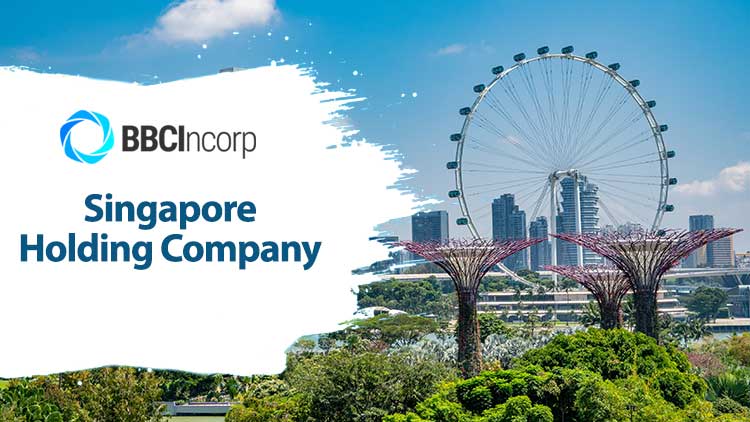
Setting up a holding company in Singapore can be a good start to establish your global holding structure. Over the years, many large corporations have built their holding structures all over the world, in Singapore included, to expand their businesses and minimize payable taxes.
Many giants like Alphabet (Google), DBS Group, and Berkshire Hathaway have either set up their holding or subsidiary companies in the city-state. Indeed, Singapore has many elements that make it one of the most ideal places to establish a holding company. Among the benefits, the ease of Singapore incorporation and its favorable tax system is the most crucial.
1. Definition of a Holding Company in Singapore

A holding company is a company that has shares in other companies, meaning it owns those companies. A holding company can also hold other types of assets such as property, stocks, trademarks, and patents.
A holding company may be called the parent or umbrella company in a holding structure. Meanwhile, the owned companies are referred to as subsidiaries.
Many investors choose a holding company to start their investment in Singapore. Thus, Singapore investment holding company accounts for a significant number of total holding companies within the country.
An investment holding company refers to a company that owns only investment in properties and shares. It receives only investment income (non-trade income) mainly from dividends, interest, and rental. This type of holding company does not conduct any business or trade.
2. Advantages of Setting up a Holding Company in Singapore
If you are planning to build a holding structure, Singapore should be on your shortlist. The regulatory framework in Singapore can provide you with great advantages to set up a holding company.
2.1. Tax Benefits
Singapore has a very favorable tax system. Understanding The Taxation In Singapore will help your holding structure minimize the payable taxes.
Single-tier corporate tax system
A Singapore company’s income is only taxed once. The shareholders of that company will not be taxed on the received dividends. This means that the dividends you receive from your Singapore holding company will not be taxed.

The current corporate tax rate is 17%. However, the tax that your holding company in Singapore needs to pay can be much lower, due to many tax-cut schemes. With the Partial tax exemption scheme, your holding company can be entitled to:
- A 75% tax exemption on the first $10,000 of income, and
- An additional 50% tax exemption on the next $190,000 of income.
With this scheme, the effective income tax rates are only 4.25% (on the first $10,000) and 8.50% (on the next $190.000). Furthermore, it can receive a tax rebate annually. The local tax authority will compute the amount and rebate it automatically. Prior to those schemes, your Singapore holding company can also make use of some expense deductions to minimize the assessable income.
Moreover, there is no capital gains tax in Singapore and no withholding tax when dividends are paid to both Singapore tax residents and non-tax residents.
Foreign income tax exemption
Noticeably, Singapore puts a tax on the income that is earned from foreign sources, but only when it is received in Singapore. This means your Singapore holding company can be subject to local tax when it receives income from foreign subsidiaries (dividends for example).
Nevertheless, by meeting the following criteria, your holding company can be exempted from foreign-sourced income:
- The income has already been subject to tax in the foreign jurisdiction
- The headline tax rate in the foreign jurisdiction is at least 15% when the income is received in Singapore
- The local tax authority is convinced that the exemption is beneficial to Singapore tax residents.
Learn more: How to be Exempted from Foreign Income Tax
Double tax treaties
Singapore has built a network of double tax treaties with more than 80 countries around the globe. These tax agreements mean reduced tax rates or even tax exemptions when an income is transferred between Singapore and a signed country.
When your Singapore holding company receives dividends, interest, or royalties from a subsidiary located in a country that has a tax treaty with Singapore, it may pay less tax or no tax at all. So, if you are aiming for a holding company in Singapore, consider establishing your subsidiaries in suitable countries to make use of Singapore’s network of tax treaties.
Want to know more about how your holding company can facilitate the extensive network of tax treaties? Explore An Introduction To Double Tax Treaty In Singapore.
2.2. Loss Minimization and Flexible Management

There is no limitation on the number of subsidiaries and other assets that your Singapore holding company can hold. Besides, you can base the subsidiaries in Singapore or anywhere else in the world. This feature makes it convenient for you to manage the company.
When you form the company under a structure associated with limited liability, you can guarantee a high degree of safety to your holding structure. If a subsidiary does great, it will certainly benefit your holding company. However, if it performs poorly or even goes bankrupt, the only loss that your holding company has to bear is the owned shares.
In other words, the holding company isn’t liable for obligations and liabilities of any subsidiary.
The same concept is applied at the subsidiary level. As long as all subsidiaries have a separate legal status, the liability of one subsidiary will not flow to others. Remember, safety is key. So, you should establish a separate business entity for all business units. If one of the units fails, other companies in the holding structure will not be affected.
In addition, a holding structure can result in better financing. Particularly, your Singapore holding company can flexibly use the collected profits to reinvest or support potential subsidiaries.
2.3. Group Relief
Group relief is a system that enables a company to transfer “loss items” to another company within the same group. The loss items include:
- Current year unabsorbed capital allowances
- Current year unabsorbed trade losses
- Current year unabsorbed donations

Under the group relief system, the loss items of a subsidiary can be used to offset against the assessable income of another subsidiary in your holding structure. The loss-transferring company is called the transferor, meanwhile, the loss-receiving company is called the claimant.
In order to transfer loss from one to another, you must satisfy all of the following conditions:
- Both the transferor and claimant are Singapore-based companies
- Both are in the same group by maintaining the 75% shareholding rate (*)
- Both have the same financial year end.
(*)To be more specific, two companies are considered in the same group when:
- One company holds at least 75% of the ordinary share capital of the other company (directly or indirectly), or
- A third Singapore-incorporated company holds at least 75% of the ordinary share capital of each of those two companies.
The rate of 75% must be maintained during the whole basis period.
2.4. Ease of Incorporation
A holding company can come under different types of companies in Singapore. Such types can be a limited liability company, limited partnership or a corporation. Among those, private limited company is mostly preferred. The reasons are due to its separate legal status, its members’ limited liability, and its eligibility for many tax-cut schemes.
A private limited company in Singapore can be easily established online in a couple of days. With the help of a good service provider, you only need to supply the necessary information and the required documents. The service provider will be the one who files and submits the application on your behalf. The result will be informed to you via email.
3. Challenges of Setting up a Holding Company in Singapore
Your Singapore holding company should bring economic value to the country. You should not establish a holding structure in Singapore just solely for tax avoidance purposes. That said, you should follow the following principle and requirements in Singapore:
Arm’s length principle: this is the standard for price transfer between related parties in Singapore. Long story short, when one company in your holding structure makes a transaction with another related company (in the same group), the price of such transaction must be the same as when it would have transacted with another unrelated company (outside the group) in the same circumstance.
Country-by-country reporting (CbCR): your holding company in Singapore need to submit a CbCR for all entities in the group to the local tax authority if:
- It is the ultimate parent entity of the group, and
- Is a tax resident in Singapore, and
- The consolidated revenue of the group was no less than $1,125 million in the preceding year, and
- The group has at least a foreign subsidiary.

In addition, structure complexity can put heavy pressure on the need for careful planning and effective management. Paperwork will be unpleasant. Potential conflicts can happen between subsidiaries. Decisions are likely to be made more slowly since they may have an impact on the whole holding structure. More and more issues may arise when the whole holding business grows.
4. How to Set up a Singapore Holding Company
It is recommended that you should establish a holding company in Singapore under the type of a private limited company. To do so, you need to meet the following incorporation requirements:
- Engaging a Singapore company incorporation service
- Having a director who locally resides in Singapore
- Having a local office address in Singapore
- Appointing a company secretary within 6 months after incorporation
- Appointing an auditor within 3 months after incorporation (unless your company is deemed a small company)
According to the Accounting and Corporate Regulatory Authority (ACRA), if you are a foreigner, you should engage a Singapore company incorporation service for the registration. The service provider also helps you fulfill compliance requirements.

After making the payment for the service package you picked, you need to tell the provider the name of the company. Next, upon request, you need to supply some required documents. The required documents are mainly about the company’s details and its shareholders’ backgrounds (which can be either individuals or corporations).
The service provider will proceed to file and submit the application to ACRA on your behalf. The processing time is usually a couple of days, or 24 hours if everything runs smoothly. However, it can be extended to a couple of weeks if your application needs further review from the government agency.
Incorporate your Singapore company with BBCIncorp – a trusted and experienced incorporation agent to receive extra benefits such as bank account opening support.
5. Bank Account Application for Singapore Holding Company
Opening a bank account is crucial to manage the financial transactions. In some cases, it can be more challenging to obtain the account, especially when you are non-resident and not residing in Singapore.
Singapore banks normally review applications from holding companies more carefully, especially from investment holding companies (since these do not carry out any trading activities). The banks may request face-to-face interviews and strict verification.
So, the tip here is to well prepare the application with a good set of trading proof. The proof can be agreements, contracts, and reports from the existing companies that you own. If you want to apply for a bank account for your holding company, contact us! We have successfully opened bank accounts for clients with holding companies in Singapore.
6. Conclusion
It is highly recommended that you should establish your Singapore holding company as a private limited company.
A holding structure in Singapore can be rather safe if you register separate entities for different business lines. Taxation in Singapore can benefit your holding structure a lot. The corporate income tax is low. Your local Singapore holding company can be exempted from foreign income and pay less tax due to tax-cut schemes. Not to mention there is no capital gains tax and no dividend tax.
In order to set up a holding company in Singapore, you should consult a trustworthy service provider. Not only can they help you with the incorporation but also they can help you increase the chance to get a corporate bank account afterward.
If you have any questions on the matter of holding company in Singapore, contact us now for answers!
Disclaimer
While BBCIncorp strives to make the information on this website as timely and accurate as possible, the information itself is for reference purposes only. BBCIncorp would like to inform readers that we make no representation or warranty, express or implied. Feel free to contact BCCIncorp’s customer services for advice on specific cases.
Get helpful tips and info from our newsletter!
Stay in the know and be empowered with our strategic how-tos, resources, and guidelines.

